October 11, 2019
Air Date: October 11, 2019
FULL SHOW
SEGMENTS
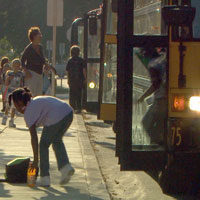
Youth Mental Health Problems From Pollution
View the page for this story
A deadly form of air pollution known as "small particulate matter" is linked to as many as 20,000 excess deaths in the United States, mostly in the form of cardiovascular events such as strokes or heart attacks. Now, there is mounting evidence that these small, PM 2.5 particulates may also be harming the mental health of children and teens by worsening depression, anxiety, suicidality and more. Brian Bienkowski, the editor of Environmental Health News joins Host Steve Curwood to talk about the correlation. (06:19)
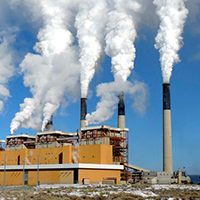
Beyond the Headlines
/ Peter DykstraView the page for this story
In this week’s trip Beyond the Headlines, Peter Dykstra and host Steve Curwood discuss the decline of coal, as a major Western utility pivots to renewables and Murray Energy faces potential bankruptcy. Also, recent reports paint a picture of science in crisis under the Trump Administration. And in the history calendar, it’s been ten years since an island government held a cabinet meeting under water to draw attention to the vulnerability of low-lying nations to climate change. (05:36)
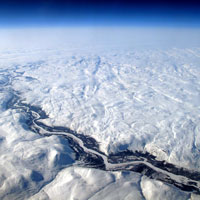
Whistleblowers on Trump Science
View the page for this story
Six whistleblowers who formerly worked at EPA, the National Park Service and more have come forward to highlight how the Trump Administration has meddled in scientific reports and communication. They say the White House has prevented crucial scientific information about climate change and more from reaching the public and decision makers. Oliver Milman from the Guardian shared their stories with Host Steve Curwood. (13:01)
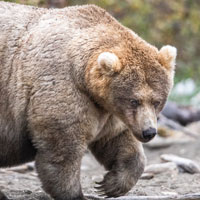
The 2019 Fat Bear Week Champion
View the page for this story
The 2019 Alaskan fat bear tournament is over and we have a winner! Fat Bear Week is a yearly competition organized by Katmai National Park and Preserve in southern Alaska to honor the fattest brown bear, since a fat bear has a better chance of staying healthy through the long winter months. Katmai Media Ranger Naomi Boak joined Living on Earth’s Bobby Bascomb to name this year’s corpulent champion. (06:29)
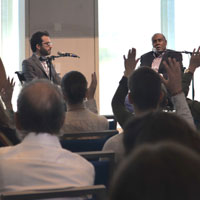
Saving the Planet Begins at Breakfast
View the page for this story
More people than ever before now believe climate change is happening and is fueled by human activities, but translating that belief into actual greenhouse gas emissions reductions remains a challenge. Jonathan Safran Foer addresses this and more in his new book, We Are the Weather: Saving the Planet Begins at Breakfast. He describes the power of collective actions to deal with the climate crisis, and points to our three meals a day as a great place to start. Jonathan Foer spoke with Host Steve Curwood at a recent live event in Boston. (14:21)
Show Credits and Funders
Show Transcript
HOSTS: Steve Curwood
GUESTS: Brian Bienkowski, Naomi Boak, Jonathan Safran Foer, Oliver Milman
REPORTERS: Peter Dykstra
[THEME]
CURWOOD: From Public Radio International – this is Living On Earth.
[THEME]
CURWOOD: I’m Steve Curwood.
If you’re worried about saving the planet some say a good place to start is breakfast.
SAFRAN FOER: I don’t think that half of the population of America is going to be vegetarian in ten years. I think there’s a pretty good chance that half of the meals eaten in America will be vegetarian in ten years, and that will have the same outcome. It’s a completely different way of looking at the same problem.
CURWOOD: Also, we celebrate the corpulent contestants of Katmai National Park’s Fat Bear Week as they stock up for the long winter.
BOAK: 747 really put in a good, strong effort. And, I think maybe he stopped because his belly might have touched the ground. So, he's really really big. And, Chunk, number 32 is another really, really big bear.
CURWOOD: It’s all this week on Living on Earth – Stick Around!
[NEWSBREAK MUSIC: Boards Of Canada “Zoetrope” from “In A Beautiful Place Out In The Country” (Warp Records 2000)]
[THEME]
Youth Mental Health Problems From Pollution
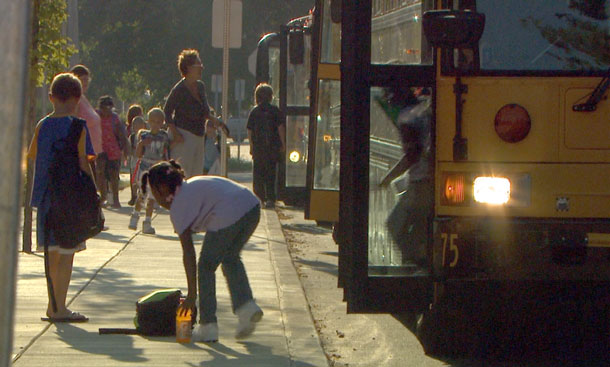
Children’s worsening mental health effects may be linked to small particulate matter air pollution, which comes from sources like the burning of diesel fuel. (Photo: Indiana Public Media, Flickr, CC BY-NC 2.0)
CURWOOD: From PRI and the Jennifer and Ted Stanley Studios at the University of Massachusetts Boston, this is Living on Earth. I’m Steve Curwood.
A deadly form of air pollution called small particulates is linked to as many as 20,000 excess deaths in the US every year, mostly in the form of cardiovascular events such as strokes and heart attacks. Now there is evidence published in Environmental Health Perspectives that suggests small particulates known as PM 2.5 may also be harming the mental health of children by worsening depression, anxiety and other troubles such as bipolar disorder and suicidality. Researchers at the University of Cincinnati and Cincinnati Children’s Hospital examined over 13,000 emergency room visits, and looked back at recent exposures to small particulates which mostly come from fires and the burning of fossil fuels like coal and gasoline. Brian Bienkowski is the editor of Environmental Health News, and he joins us now with more on the story. Welcome back to Living on Earth Brian!
BIENKOWSKI: Thanks for having me, Steve.
CURWOOD: Statistics show that around one in seven kids in the US have a mental health condition. How many kids were looked at in this study?
BIENKOWSKI: So, they ended up examining about 6,800 children, and some of them had multiple emergency room visits over a five year span. So, it was about 13,000 emergency room visits for those kids.
CURWOOD: And when they went to the emergency room, they were psychiatric emergency room visits.
BIENKOWSKI: Right. So, we're talking about anxiety, depression, bipolar disorder, schizophrenia, kids who are experiencing thoughts of suicide. And these are usually cases that are pretty serious if you're ending up in the ER.
CURWOOD: And how bad was the air pollution that these children experienced?
BIENKOWSKI: So it varied. What the researchers did was look at an air pollution type called PM 2.5, which is very small, tiny particular matter. And for every 10 microgram per cubic meter of increase in this air pollution, they saw a large jump in emergency room visits for the kids. And this kind of pollution comes from you know, everything from traffic, to industry, to dust from wildfires.
CURWOOD: How did these levels compared to the federal guidelines?
BIENKOWSKI: All of the air pollution that they looked at, the kids were experiencing air that would not be regulated under the federal guidelines for PM 2.5.
CURWOOD: So, in other words, the air was considered safe.
BIENKOWSKI: Correct.
CURWOOD: There was some correlation between children's mental health and their exposure to air pollution. What other factors might have been examined during this study, say socioeconomic status or race?
BIENKOWSKI: So, kids that come from high poverty neighborhoods were more susceptible to the air pollution being correlated with more ER visits. The hypothesis is that poverty causes high stress, inflammation that can harm children's brains, all these things can exacerbate mental health disorders. And so, when you add in the air pollution, the idea is you get this double whammy approach.
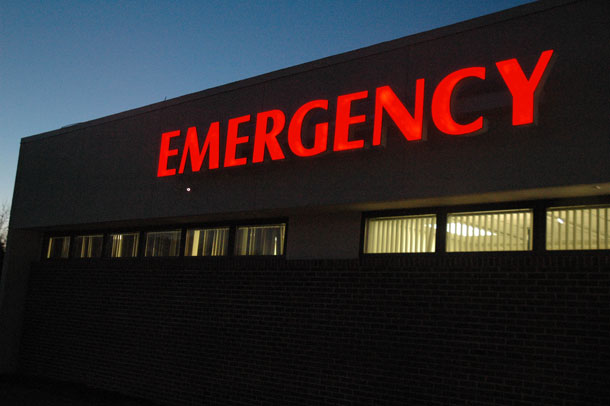
Over 13,000 psychiatric emergency room visits, made by about 6,000 children, were analyzed for this study. (Photo: Eric Staszczak, KOMU, Flickr, CC BY 2.0)
CURWOOD: So, if we have one in seven children in the United States with mental health issues, and in many places, even federally-okay ambient air sending kids to the emergency room, how big a deal is this?
BIENKOWSKI: Well, it's hard to say, Steve. What we don't know is how or why the air pollution is causing these problems in children if in fact, it is. Some studies suggest, in laboratory animals, that air pollution can spur inflammation, oxidative stress, perhaps even impact our brain chemistry, our DNA. All of these would in fact, spur or exacerbate mental health problems in children. But we don't know that for certain right now, all we're seeing is these high correlations between children that do experience high exposures to air pollution, and going into the ER or reporting symptoms of mental health disorders.
CURWOOD: Now that we understand that there's a correlation between aggravation of mental health conditions, and particularly pollution, what advice if any, is out there to help parents cope with this with their children if they have such mental health conditions?
BIENKOWSKI: So, the simple answer is when there's pollution try to get away from it. And that's just not for mental health disorders. We already know that air pollution is triggering asthma and lung problems and also heart conditions in people. So less pollution is better, even if this link is not yet fully proven. But this can mean keeping your children away from high traffic areas. If a nearby industry is going to have some kind of large emission event, to make sure that the children are indoors or not around that. If there's a wildfire or other sources of particulate matter, just try to make sure that the children are indoors and not outside breathing that air in.
CURWOOD: So, as I understand it, this study looked at five or so years of data from Cincinnati, Ohio. But there's been other research that suggests the link between worsening mental health and air pollution. Share some of that with us, if you could, please.
BIENKOWSKI: Sure. In fact, these same researchers right there in Cincinnati, just back in May, they looked at traffic related air pollution. And they linked it to the same cohort: children having higher anxiety. So, similar data, but looking specifically at traffic pollution. And then in the companion study, they found that traffic pollution was associated with more self-reported depression and anxiety in the children. So again, these are all correlation studies, but all kind of have that same finding. And then just in August, I wrote about a large study of Danish and U.S. folks, and these were not children, but these were adults. And those who were exposed to high levels of air pollution had greater odds of suffering from all kinds of illnesses like depression, schizophrenia, and bipolar disorder. And some of these links were off the charts.
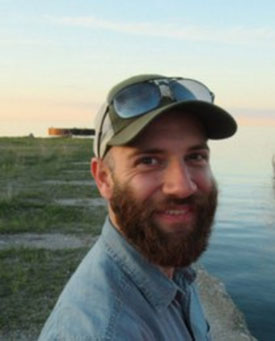
Brian Bienkowski is the editor of Environmental Health News. (Photo: Courtesy of Environmental Health News)
CURWOOD: So, the sources of particulate matter, 2.5 microns, scientists call it PM 2.5, are largely associated, I guess, with fossil fuels, and in particular, heavier fossil fuels like diesel and coal tend to have even more of this stuff.
BIENKOWSKI: Correct.
CURWOOD: And there's been some controversy. In fact, I think, even some concern in some communities about school buses that burn diesel, they idle. And there's a big crowd of particulates around kids that might be waiting to get on or those who sit in the back of the bus.
BIENKOWSKI: Right.
CURWOOD: To what extent do you think this research adds to those concerns that people have about those exposures?
BIENKOWSKI: Well, I think it certainly adds to them. And if you think about what we already know about air pollution, again, you're talking about developing lungs in these young children. You're talking about links to heart problems with this particulate matter. We already have enough evidence to know that this is bad, that this is harming health. So, when you add on this layer of mental health research, it's just another strike against using these kind of fuels that we know are harming our health and the futures of our children.
CURWOOD: So, maybe if there's a bright side to this as we move to electricity for transportation and get away from burning fuel, maybe we'll be happier, huh?
BIENKOWSKI: Well, that certainly could be true. Save on healthcare costs, happier children.
CURWOOD: Brian Bienkowski is the editor of Environmental Health News. Thanks so much for taking the time with us today, Brian.
BIENKOWSKI: Thanks for having me, Steve.
Related links:
- Environmental Health News | “Is Air Pollution Worsening Kids’ Mental Health?”
- Click here to read the study in Environmental Health Perspectives
[MUSIC: Bob Zentz, “Horizons” on Songs for the Earth: A Tribute to Rachel Carson, M.U.S.E]
Beyond the Headlines
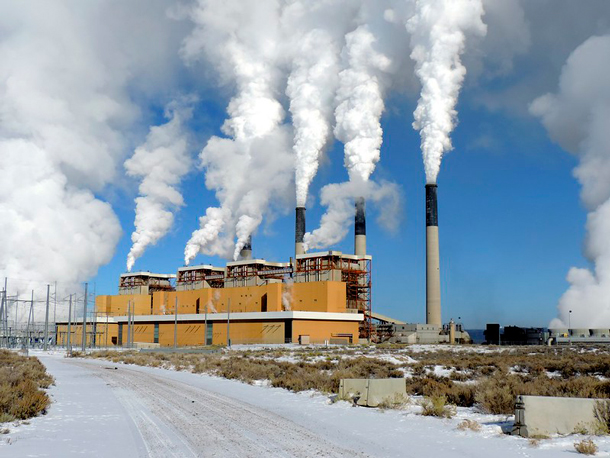
Western utility PacifiCorp has decided to decommission its Jim Bridger coal plant in Wyoming in an effort to cut costs. (Photo: WildEarth Guardians, Flickr CC BY-NC-ND 2.0)
CURWOOD: It's time now to take a look beyond the headlines with Peter Dykstra. Peter's an editor with Environmental Health News, that's ehn.org and DailyClimate.org. He's joining us now from Atlanta, Georgia, where -- Peter, I hope it's warmer than it is up here in New England where it's getting kind of cold.
DYKSTRA: Oh, it's gettin' to be fall down here too, although you guys find fall and winter a lot quicker than we do.
CURWOOD: [LAUGHS] Indeed. Hey, what do you have for us this week?
DYKSTRA: We got some coal news from the Pacific Northwest and Northern Rockies. One of the biggest utilities out that way is PacifiCorp. It's got primarily coal plants in six states: Northern California, Oregon, Washington, Idaho, Wyoming, and Utah. They power cities like Salt Lake City, and they are, for the most part, announcing that they're getting out of the coal business and investing in renewables, wind and solar. And the reasons for their doing that have nothing to do with climate change.
CURWOOD: Oh? What do they say?
DYKSTRA: Well, it's all cheaper. Prices have been going down for wind and solar. PacifiCorp sees that as a long-term trend. And so plants like the Jim Bridger coal plant, one of the biggest in the country, in western Wyoming, adjacent to the Powder River coalfields, some of the biggest in the country, look like they're going to be going out of business fairly soon.
CURWOOD: Oh, okay, so coal is definitely on its way out if a company like this is getting out of the business.
DYKSTRA: That's right. And there's one more bit of coal news from Ohio, where Murray Energy is headquartered. That, of course, is the company led by the very colorful coal baron Bob Murray. They're looking at a potential bankruptcy. Murray says they've missed payments to some of their largest creditors. Bankruptcy could be an option before the end of this month. It's the biggest privately held coal company in the country. And of course, Bob Murray has been the most outspoken against government regulation of the coal industry. He also used to employ a lobbyist named Andrew Wheeler, who's now the head of the EPA.
CURWOOD: This is an interesting trend, isn't it, Peter. Hey, what else do you have for us?
DYKSTRA: A couple of new reports that paint a picture of science in crisis under the Trump administration. There's a peer reviewed report in the journal Environmental Research Communications that talks about how even while acceptance of climate science has grown among the American public, it's actually shrunken somewhat among American policymakers.
CURWOOD: Oh, so wait a second, as the public gets smarter about climate science, policymakers are getting, well, can we say less smart?
DYKSTRA: Who'd a thunk it, Steve, and that's apparently what's happening. There's another report out from the Brennan Center for Justice that says that federal science has reached a crisis point, exactly because of the same polarization. They give a few examples; this is a bipartisan panel that studied this that included the former EPA Administrator Christine Whitman, former Republican Senator Chuck Hagel. They point to examples like how advisory boards are stocked with scientists from industry these days, rather than more independent scientists; how the Interior Department reassigned its head climate scientist after he, imagine this, talked about climate change; and then the Trump administration's foray into weather forecasting, when there was a Sharpie used to alter the weather map to make it look like Hurricane Dorian was hitting Alabama.
CURWOOD: And we heard that the people at the National Weather Service were going to get in trouble if they didn't agree with the White House assessment.
DYKSTRA: They were politely told to agree. That's one more example of how science is being run off the rails in the Trump administration.
CURWOOD: And elsewhere in the broadcast, we have the story of six whistleblowers that have been -- well, should we say, blockaded in their efforts to report on climate related science.
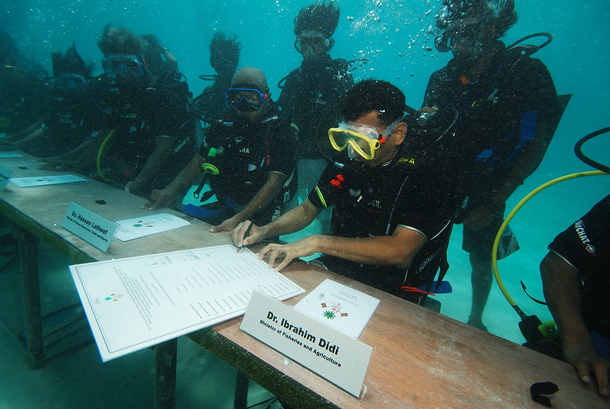
It’s the ten-year anniversary of the underwater cabinet meeting the government of the Maldives held to highlight the threat that climate change poses to the low-lying island nation. (Photo: Presidency Maldives, Flickr CC BY-NC 2.0)
DYKSTRA: There's a lot to talk about with whistleblowers these days.
CURWOOD: Certainly is! Hey, let's look back in the annals of history to -- to what, Peter? What are we going to look at?
DYKSTRA: Well, I've got a 10th anniversary going back to October 17th, 2009. And the reason is struck me is that it's the 10th anniversary of a bit of theatrics to show the urgency of climate change -- we've been doing this for 10 years already. Specifically, 10 years ago, the President and the entire cabinet of the Maldives, an island nation in the Indian Ocean, held a Cabinet meeting underwater. 30 minutes, about 13 feet under. The President, Mohamed Nasheed, his cabinet ministers, his vice president, all met underwater. A few months after that, they were deposed in a peaceful coup. And now here we are 10 years later, the Maldives still looking at the prospect of being completely underwater -- not the cabinet, the whole country by the end of the century.
CURWOOD: Yeah, you know, I remember that Peter. In fact, seeing pictures of the president and his cabinet with scuba gear, their masks and flippers, poring over some, I guess, waterproof papers there.
DYKSTRA: They must have been; I'm not sure how much they got done, but it certainly was the most newsworthy cabinet meeting in the Maldives in world history.
CURWOOD: Thanks, Peter! Peter Dykstra is an editor with Environmental Health News, that's ehn.org, and dailyclimate.org. We'll talk to again real soon, Pete.
DYKSTRA: Okay, Steve, thanks a lot. Talk to you soon.
CURWOOD: And there's more of these stories at our Living on Earth website. That's LOE dot ORG.
Related links:
- E&E News | “Big utility ditches coal for wind because it’s cheaper”
- Pittsburgh Post-Gazette | “U.S. coal giant that pressed Trump for bailout faces default”
- Journal article: climate science acceptance is on the decline among U.S. policymakers
- Brennan Center for Justice report outlining political interference in government science
- Ten years ago, the government of the Maldives held a cabinet meeting underwater to highlight the threat of climate change
[MUSIC: The RH Factor, “Family” on Distractions, Verve]
CURWOOD: Coming up – whistle blowers allege the perversion of science by the Trump Administration. That’s just ahead here on Living on Earth.
ANNOUNCER: Support for Living on Earth comes from Sailors for the Sea and Oceana. Helping boaters race clean, sail green and protect the seas they love. More information at sailors for the sea dot org.
[CUTAWAY MUSIC: The RH Factor, “Family” on Distractions, Verve]
Whistleblowers on Trump Science
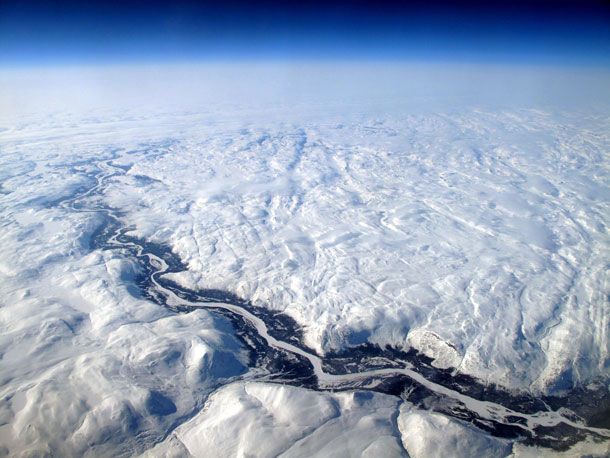
Joe Clement studied the effects of climate change on communities living in arctic regions for the Department of Interior. (Photo: Duncan C., Flickr, CC BY NC-2.0)
CURWOOD: It’s Living on Earth, I’m Steve Curwood.
In the nearly three years since President Donald Trump took the oath of office, his administration has slashed environmental regulations it calls burdensome. As Peter Dykstra mentioned earlier, in many of these cases science has been sidelined by the Trump Administration. Six whistleblowers have now come forward to highlight how this White House has prevented crucial scientific information about climate change and more from reaching the public and decisionmakers. Oliver Milman is a reporter with the Guardian who has talked with these whistle blowers. They claim that their work has been ignored, undermined, and altered. Oliver joins me on the line from New York. Welcome to Living on Earth!
MILMAN: Good to be with you Steve.
CURWOOD: So let's talk about these climate whistleblowers in the federal government. What about the senior engineer who was involved with the EPA's vehicles lab? What happened with him?
MILMAN: Yeah, so Jeff Olson was a long term EPA employee, he'd done about 40 years with the agency. And he worked at a lab in Michigan that did testing on cars to see what kind of pollutants they gave out, and how efficient they run. And when Obama came in and started bringing in greenhouse gas standards for vehicles. They said about having a new rule that would ensure that cars running cleaner, he said that that rule essentially was reversed once Trump came in. He said that there was a replacement plan put in that he felt extremely ashamed about. He said, his colleagues felt very shamed about it. And when their names on it, he said that they'd essentially cook the books to make it look like this new rule would be disastrous, and the Trump replacing rule be far better. So essentially, the replacement rule waters down what a bomb was trying to do, allows more pollution to be emitted from cars and trucks. And he felt extremely disgusted by that he felt betrayed by it. And he felt it was the right time to leave, he decided to take retirement. And so, he said it, morale is extremely low, the lowest been in 40 years.
CURWOOD: And what does the EPA say about Jeff Olson?
MILMAN: So they say the new vehicles emission standards, rules are far better, they will save lives, they'll lead to cheaper cars. This is disputed by a lot of experts who say, Oh, actually they cost more because you have to put more more gas in your car because it won't be as efficient as under the Obama rules. So again, there's no specific response to what Jeff had to say other than the agency is doing its best for the people.
CURWOOD: So we look to the Environmental Protection Agency for a number of things, including taking care of clean water and drinkable water. One of the people you wrote about is a whistleblower in terms of the criteria for drinkable water. Talk to me about her story.
MILMAN: Yes, a Betsy Southerland is also a long term, EPA employee, she she started working for them in 1984. She did a 33 years at the agency very much a respected, well liked veteran of of the agency. She worked on clean water programs. And she felt a huge change occurred after the Trump administration took power. And she decided that 2017 would be her last year at the agency. She made this very kind of public retirement speech that she made to colleagues but then kind of released it publicly saying that the mission of the agency has been subverted, that it was causing a risk to people people's health. And since she's left, she's become a very kind of outspoken critic of administration. She says this has made her target of retaliatory action by the administration, which the administration denies. She's become one of the leading voices I suppose in opposition to the Trump administration's handling of environmental protection.
CURWOOD: What does the EPA say about her?
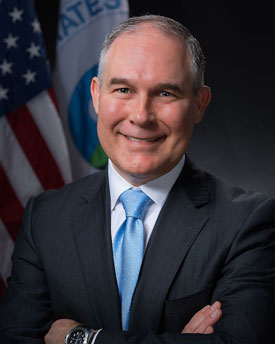
Scott Pruitt had to resign in July of 2018 from his position as the Administrator of the Environmental Protection Agency in the wake of numerous investigations over conflicts of interest. He received sharp criticism for his industry-friendly agenda. (Photo: Eric Vance, EPA, Flickr, Public Domain)
MILMAN: So they've kind of previously called her a kind of, disgruntled former employee, they've kind of denied that there was any improper conduct with her, certainly not the specific denials as formers aware of her allegations, where she said that former industry people were coming in to help rewrite rules around chemical safety. She said there was also an inappropriate contact between Scott Pruitt, who's EPA administrator and Bob Murray, who say who runs a large coal mining firm. And shortly after that conversation, a rule around how coal fire power plants dump their waste, their toxic waste into waterways was repealed. So she's kind of linking the kind of industry influence quite directly to rollbacks in the EPA's rulebook, the EPA hasn't really addressed that other than to insist that it's doing things by the book.
CURWOOD: And what about the person who was looking at possible climate disruption impacts at the Superfund sites, whether it's flooding or heat and such?
MILMAN: Jacob Carter was looking at the impacts of climate change from Superfund sites. So these are toxic sites that the federal government's involved in in terms of cleaning them up. And he was looking at how future storms and sea level rise would affect those sites potentially move pollution around into surrounding areas. So it's a kind of a pressing worry as the world warms up and these weather patterns become more unpredictable. A kind of key concern is how they affect Superfund sites. So he did some work on that was then told, after President Trump came in, he should basically look for a new job. He was there on a year to year basis. So postdoctoral fellow so he would’ve had to be renewed anyway. And that became very unlikely once President Trump came in. And he said there was a deeply upsetting time for him and his life. He was very sad to see the direction that the agency was taking. And he feels the science he was working on was essentially tossed to one side.
CURWOOD: Let's turn now to the chap who was sharing the EPA's Clean Air Scientific Advisory Committee. Talk to me about him and what his concerns and complaints are.
MILMAN: Right. So, this is a man called Chris Frey, he's a environmental engineer at North Carolina State University. And he was chairman of the EPA clean air Scientific Advisory Committee, a member of the science advisory board, which essentially panels set up to advise the EPA on their rules around clean air from things such as trucks and cars and power plants and so on. He was going to be a member of this group that was going to look at particulate matter, which is essentially the suit that's given off from cars and trucks and power plants that kind of can get lodged in your lungs and cause asthma and heart conditions and all kinds of other health impacts, that he was summarily dismissed from this because the group was broken up. The first he knew about it was from a press release on the EPA's website. And then he got an email saying that his services were no longer needed. He felt that there was a political interference in the selection of these boards that they been strayed from their mission of providing fearless and impartial advice to the EPA and was he left, and he decided to speak out about after leaving.
CURWOOD: By the way, I should ask what the Environmental Protection Agency told Professor Frey about why he would no longer be chairing that advisory board.
MILMAN: Right. He said that there was no justification given he was simply told that his services were no longer needed. And they essentially bought in a rule where anybody who got funding from the EPA for previous work was was not allowed to take part, effectively, that got rid of academics and other kind of independent experts and allowed the administration to bring in more industry friendly voices to these boards. And that's the kind of broader point that Chris Efrain others are unhappy about.
CURWOOD: The Department of Interior is in the process of opening up the Arctic National Wildlife Refuge for exploratory drilling and such. And one of the people you wrote about was pushed out from the Interior Department for raising concerns about climate disruption. Talk to me about him and what exactly he did.
MILMAN: Sure, so this is a man called Joe Clement. And he was an expert in the impacts of climate change upon the Arctic region, which is you may know is warming up at about twice the rate as the global average. So, lots of disruption already happening in the Arctic. And that is set to get far worse with the global heating that says expecting this century. So he was looking at the impacts of that, and what can be done for communities that live there. Although it's a kind of very cold and remote place, there are millions of people who live in the Arctic regions around the world. His work was looking very closely at how the government can help people who do live there, he felt he was essentially fired by being taken from this role once the new may stretching came in. And being put into a completely unrelated role, which looked after the royalties paid by oil and gas companies. It's something that he didn't have any experience in is something he had no interest in, it certainly was almost the complete opposite. If you think about the impact of oil and gas companies, when it comes to climate change, it's always the complete opposite job to be working with them on royalties rather than looking the impacts of climate change they contributed to. So, he felt he was effectively pushed out, he left and he filed a whistleblower complaint, which is still ongoing now.
CURWOOD: Bottom line sounds like they did not want him talking about climate disruption at all.
MILMAN: No, he said that they didn't want anybody speaking about the climate crisis. And they certainly don't want anybody talking about the climate crisis very publicly and openly.
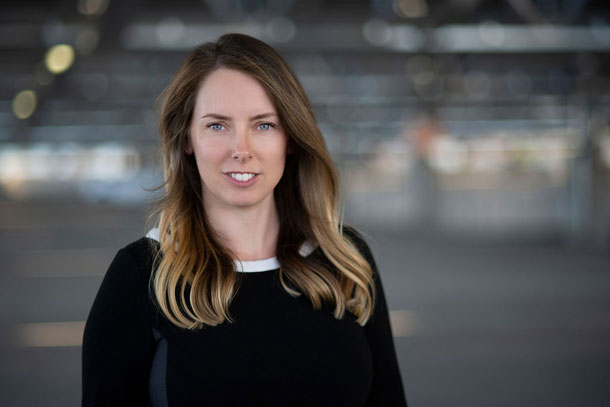
Maria Caffrey’s research focuses on climate change. (Photo: Jess Kornaki)
CURWOOD: Now, there's another person in the Interior Department, this person over though the National Park Service, who lost her job as well for speaking out about how climate disruption, how climate change could affect the national parks talk to me about her.
MILMAN: Maria Caffrey she is perhaps one of the most affecting stories, because she she worked for a good kind of four or five years on this study, looking at how sea level rise was affecting national parks across the US. There's about 118, coastal parks that are being affected by sea level rise, which was kind of looking at how that will proceed in the future and how sea level rise will threaten. And so it was essentially this report that she was working on for years was due to be released. And then along came Donald Trump's election. Once his inauguration happened, she was told it was being put on hold and was delayed and pushed back for months and months. She was told it was because of messaging concerns, whatever that meant, she wasn't sure. And then it came to the end of the year 2017. And she went on maternity leave to have a baby. And by the time she came back, she found out that her report was being edited, it was being edited in a very unusual way, in that any mention of human induced climate change was being systematically emitted from the report. And that's what she considered to be inappropriate meddling with her work. So she, she started to push back. And that's when she said things got very nasty. And she was essentially told that she can't be working with the National Park Service anymore.
CURWOOD: So she was fired?
MILMAN: The funding for her job was taken away. And she was told she could no longer she then got demoted down to an intern level where she was being paid about $25,000 a year. And then after that she actually requested to come back to work on the project as a as an unpaid volunteer, but she was turned down. And that she felt pointed the fact that this was a purely political move, it wasn't about saving any money or anything like that. The fact that she was turned down for non payroll suggested that this is an entirely political motivation rather than scientific or a funding one.
CURWOOD: What has the Interior Department said to you about this case in the others involving them?
MILMAN: They don't really address the central accusation that she mentions of human induced climate change were removed. This is something that has happened elsewhere, since the Trump administration's come in. Reports have been either shelved or edited to remove mentions of climate change. So this is a repeated thing that's happening. And there's no real justification given as to why this this will be happening.
CURWOOD: Hey Oliver, what extent were any of these whistleblowers told to lie by the administration to misrepresent the science that they had discovered?
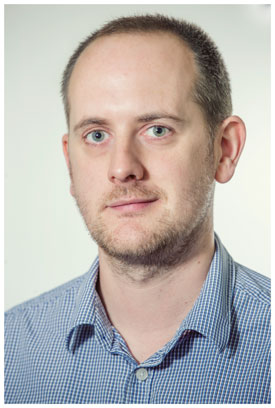
Oliver Milman is an environment reporter for The Guardian. (Photo: Photo courtesy of Oliver Milman)
MILMAN: That's something that Maria Caffery feels she essentially was asked to do when she was asked to remove mentions of human induced climate change from her report, failure essentially, was lying. She said that she told her supervisor that she felt her boss was the American people and the American people deserve to be told the truth. And she said she was told no, you your boss is President Trump. He's the chief executive of the federal government, and we're doing what pleases him. So, she felt there was a direct portrayal there of her mission which she felt was very much to serve the American people. There's this kind of sense of purpose. There's a sense of camaraderie with their colleagues, that they're doing the best for the American people that they are helping protect them from kind of big business and industry that obviously has such sway and Washington DC and they're they're kind of counterpoints that they can actually provide that kind of safeguards to the American people that wouldn't otherwise be there and they feel that that kind of mission has been completely subverted. I think they most of them feel that their work with the federal government was their kind of defining work their lives I think it's very painful to see that wrenched away from them
CURWOOD: Oliver Milman is an environmental reporter for The Guardian. Thanks so much for taking the time with us today.
MILMAN: Thank you very much Steve.
Related links:
- The Guardian | “The Silenced: Meet the Climate Whistleblowers Muzzled by Trump”
- Maria Caffrey | “Maria Caffrey’s Climate Research Website”
- Inside Climate News | “Top CDC Climate Scientist Files Whistleblower Complaint”
[MUSIC: Brad Mehldau, “Exit Music (For a Film)” on Songs: The Art Of The Trio, Volume Three, Warner Records]
You can hear our program anytime on our website, or get an audio download. The address is LOE dot org. That's LOE dot O-R-G. There you’ll also find pictures and more information about our stories. And we’d like to hear from you: You can reach us at comments @ l-o-e dot org. Once again, comments @ l-o-e dot O-R-G. Our postal address is PO Box 990007, Boston, Massachusetts, 02199. And you can call our listener line, at 617-287-4121. That’s 617-287-4121
[MUSIC: Brad Mehldau, “Exit Music (For a Film)” on Songs: The Art Of The Trio, Volume Three, Warner Records]
The 2019 Fat Bear Week Champion
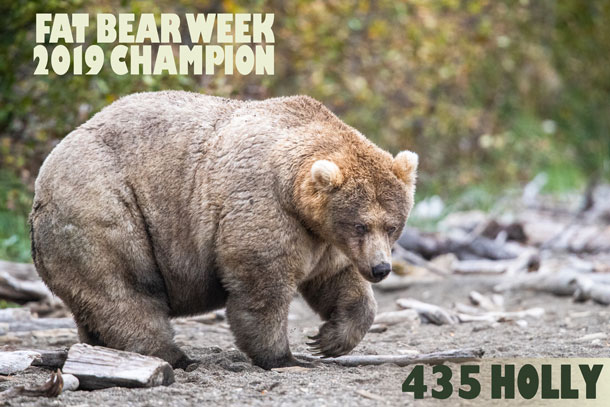
The 2019 Fat Bear Week Champion at Katmai National Park is bear 435, Holly. (Photo: Naomi Boak/Katmai Conservancy)
CURWOOD: The 2019 Alaskan fat bear tournament is over and we have a winner. Now if you tuned in couple of weeks ago you might have heard about the fishing derby at Katmai National Park in southern Alaska that is for the big brown bears. And by fishing for sockeye salmon in the Brooks River these bears get mightily rotund as they fatten up for the long Alaskan winter. The public gets to watch them on a web cam, and from October second to eighth they got to vote for their favorite fat bear. So on what’s called “Fat Bear Tuesday,” the Katmai rangers unveil the champion big bruin. Katmai Media Ranger Naomi Boak spoke with Living on Earth’s Bobby Bascomb.
BASCOMB: Who won this year's fat bear contest?
BOAK: The winner of this year's fat bear contest is bear, 435, Holly. And, she earned it!
BASCOMB: Oh, really? Well, how did she earn it?
BOAK: Well, she looks like the Michelin Man.
BASCOMB: [LAUGHS]
BOAK: She's got so many rolls of fat, and she worked hard. It was very difficult to get a picture of her in September because she was always snorkeling for fish. She was hardly ever out of the waters. Matter of fact, one of the only times I saw her come out of the water was when she came out to dig a belly hole so that she could sleep and then go back to fishing again.
BASCOMB: Wow! So she was really hard on the job then?
BOAK: Oh, yeah. And, it really shows. So, I am very happy that she is our new queen of corpulence.
BASCOMB: [LAUGHS] Now what was the vote for Holly? Was it close? Or did she win by a landslide?
BOAK: Oh, it was a blowout. She had, uhm, well over 17,000 votes. And, her competitor had, oh, I'd say 3500 votes.
BASCOMB: Oh, wow! So, no contest then.
BOAK: No, no contest. And, I'm just thrilled that it's Holly. I mean, she exemplifies what it means to be a great brown bear. She's a famous bear on Explore's bear cams. She produces beautiful cubs. She is the poster girl for a fat bear.
BASCOMB: [LAUGHS] Did she have cubs with her this year?
BOAK: No. Which is one reason that she could get so fat. Because it takes a lot of energy for a sow to feed herself and her cubs and corral them so that they don't get into trouble with boars. But when a sow is single, like Holly, she's fattening up so she can get pregnant again, because she won't get pregnant unless she's fat enough. So we've got our fingers crossed that there'll be new little Hollys next year.
BASCOMB: Aw, I hope so. Now, I understand that this year, you did something new. You did 3D scanning of some of the bears for the first time to try to determine their weight, how much they actually weighed. I mean, nobody in their right mind is going to go out there and try to weigh a bear, right? But, uh, what did you find? How much did Holly weigh, if you know?
BOAK: Uh, well we don't know how much Holly weighed. We only were able to scan a few of the bears. It's quite a process and the bear has to be out of the water. And still, for 16 to 30 seconds. Our GIS team, the survey team, scanned 747, who is a huge bear. As big as his namesake. And, his volume was 23.5 cubic feet, which is the size of a double wide refrigerator.
BASCOMB: Oh my gosh!
BOAK: And, that's a pretty accurate reading. His weight is more of a guesstimate, which is probably pretty accurate for a bear at this time of year. Guessing about 1408 pounds.
BASCOMB: Wow, holy cow! I thought they topped out at like 1200 or so pounds? I'm no bear expert, but that's what I thought was the case.
BOAK: That's probably right. But, this bear is huge! Some people in the park say he is the biggest bear they've ever seen. And, these are Rangers who have been there for a long time. So, uhm, I was a little disappointed that 747 didn't do better in this year's competition. But, we have the scan to prove his size.
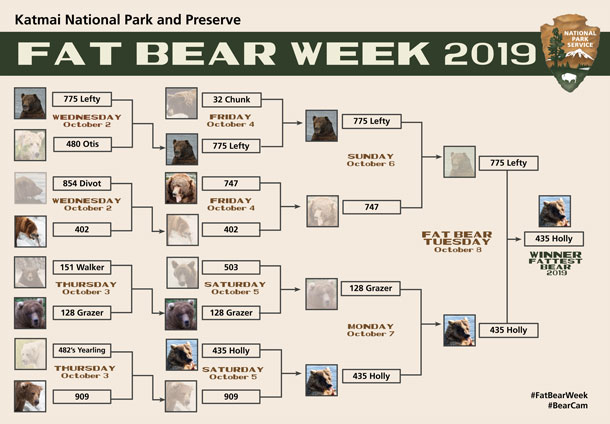
2019’s Fat Bear Week bracket had 8 competitors attempting to chew their way to the top. (Photo: Katmai Conservancy)
BASCOMB: Wow. And why do you suppose he didn't do better given his girth?
BOAK: You know, I don't know. I think it has somewhat to do with popularity. It also has to do with pictures. Because he's very difficult to photograph. I stalked him for a couple of weeks. And he's not out of the water very much. And when he is out of the water, it's the other side of the falls. But, he remains large in my heart.
BASCOMB: [LAUGHS] So, if these bears really wanna get bragging rights, they have to make themselves available for photographs?
BOAK: Absolutely! That's a big part of Fat Bear Week. Getting photographs all year long! We have to get skinny photographs of them in June and July. And, fat photographs as late as we can in September.
BASCOMB: So, Holly won but, who were the runner ups this year?
BOAK: Well, Lefty who is a bear who never used to come to the falls in July, and started doing that in 2015. And he had no idea how to fish. He would jump off the falls to try and catch a fish. It's not a good way to catch a fish at Brooks Falls.
BASCOMB: [LAUGHS]
BOAK: But, um, he learned and this year he would catch fish after fish after fish. UHM, 747 we talked about really put in a good strong effort and I think maybe he stopped because his belly might have touched the ground. So, uhm...
Yeah, it was close to touching the ground. He is really really big. And, Chunk, number 32 is another really, really big bear. And, I must also give accolades to another female bear 128 Grazer, who had to compete against Holly in a recent round. And, you can't recognize grazer from the beginning of the season to the end of the season. She has these big, white puffy ears and her face gets so fat it grows into her ears.
Are you serious?
BASCOMB: [LAUGHS]
BOAK: So, uhm, I say kudos for grazer for putting a good show and was a good competitor against the new champion Holly!
CURWOOD: That’s Katmai media ranger Naomi Boak speaking with Living on Earth’s Bobby Bascomb. For a link to the continuous live stream of the big bears of Katmai go to our website loe dot org. There you’ll also find our 2019 fat bear week preview.
Related links:
- Head over to Katmai National Park and Preserve’s Facebook page to connect with the Fat Bear Week contest
- Take a look at the bears at Brooks River on the bear cams
- More about Katmai Conservancy
- More about Katmai National Park and Preserve
- Check out Katmai’s 2019 bear ebook!
[MUSIC: Jerry Garcia and David Grisman, “Teddy Bears Picnic,” on Not For Kids Only, by John Walter Bratton and Jimmy Kennedy, Acoustic Disc]
CURWOOD: Coming up – why we are the weather and how we can begin saving the planet at breakfast. That’s just ahead on Living on Earth.
ANNOUNCER: Funding for Living on Earth comes from you, our listeners, and United Technologies, combining passion for science with engineering to create solutions designed for sustainability in aerospace, building industries, and food refrigeration. UTC companies such as Otis, Carrier, Pratt and Whitney, and UTC Aerospace systems are helping to move the world forward. You can learn more about United Technologies by tuning into the Race to Nine Billion podcast; listen at racetoninebillion.com. This is PRI, Public Radio International.
[CUTAWAY MUSIC: Bobby Hicks, “Angel’s Waltz” on Fiddle Patch, Rounder Records]
Saving the Planet Begins at Breakfast
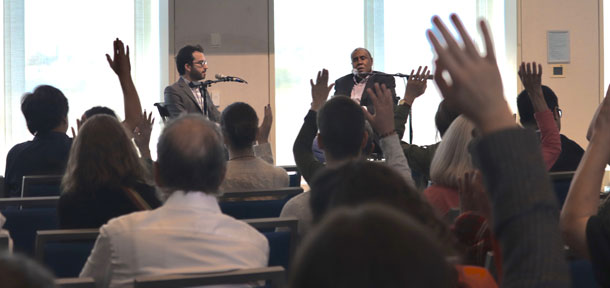
Jonathan Safran Foer was interviewed by Steve Curwood in front of a live audience at UMass Boston on October 1, 2019 (Photo: Lizz Malloy)
CURWOOD: It’s Living on Earth, I’m Steve Curwood.
Eight in 10 Americans now believe climate change is happening and is fueled by human activities. This according to a recent poll conducted by the Washington Post and the Kaiser Family Foundation. But so far believing in climate change has yet to lead to effective action to prevent its most dire impacts. Jonathan Safran Foer addresses this and more in his newest book, We Are the Weather: Saving the Planet Begins at Breakfast. He describes the power of collective actions to deal with the climate crisis, and points to our three meals a day as a great place to start. Animal agriculture is a big part of human induced climate change, and he says limiting the amount of meat we eat can go a long way towards curbing carbon emissions. Jonathan Safran Foer spoke with me at the inaugural “Good Reads on Earth” live event at UMass Boston.
CURWOOD: Jonathan, thanks for joining us today.
FOER: Thank you so much.
CURWOOD: Your book takes a really fascinating take at the climate emergency of today. And you start with the notion that we're kind of removed from it, that the climate emergency is not here; it's over there. What do you mean by that?
FOER: I should begin by saying more than anything, the book is a real personal exploration of my own responses and lack of responses to the climate crisis and was the result of having reached a place that felt intolerable. Do you have kids by any chance?
CURWOOD: Yes.
FOER: Okay. So I have kids, and I don't know if you've ever had the experience of the kids, you know, playing in the other room, and they're rough housing, but it's okay. It's tolerable. And you're trying to get something done, let's say the kitchen counter, and they're making more noise and somebody hits somebody, and it's still okay. And then something breaks, and it's still okay. And then somebody starts crying, and you slam your hands on the kitchen counter and say, "enough." And then you get up from what you're doing and you go over there. That was more or less the moment that I had, except that I was both the kid and the parent, where I heard myself saying, over and over, somebody has to do something. But the somebody's never included me. And I felt these extremely brief and contained periods, or moments really, of alarm of anger, of sadness, almost always when an image was in front of me, an image of Amazon burning an image of another superstorm, wildfires in California. And yet, when the image wasn't in front of me, those emotions, and my feeling of connection to them all but completely vanished. It was very, very easy to get back to the life that I was living, which included many bad behaviors that were contributing to the problems that so alarmed me. So, I decided to devote time and mental space to figuring out how to stop saying someone has to do something and to learn what it is that an individual might do.
CURWOOD: Talk to us about one of the incidents that really kind of got you going, and that was when Superstorm Sandy fired up and you found yourself out of town.
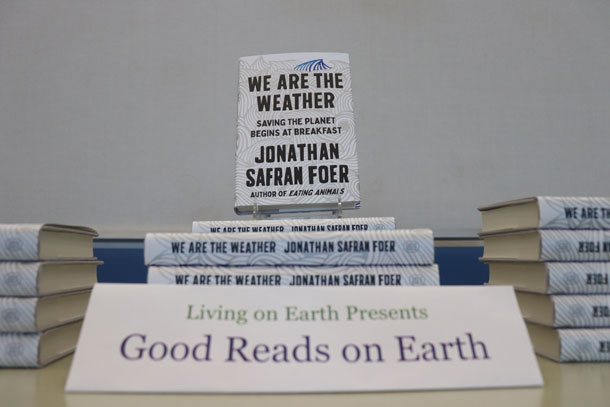
Living on Earth recorded this interview live as part of its event series, Good Reads on Earth. (Photo: Lizz Malloy)
FOER: I was in Detroit, and giving a reading for a novel and the storm-- everybody knew the approximate path of the storm and the touchdown time in New York. I thought that I was going to be able to catch the last flight out. As it turned out, the flight was canceled. So I rented a car and drove through the night back to New York, for no obvious reason. You know, the house was well prepared for the storm. We had the food and the pantry and the flashlights with the fresh batteries in the closet, fresh water. But I wanted to drive back. I felt the need to drive back. And it's a need. Or it's an action that was sort of easy to applaud. It was easy for my parents, my wife, my kids to applaud it. And it was very easy to applaud myself for having done it.
CURWOOD: Good dad, you showed up.
FOER: Good dad. You did the right thing.
CURWOOD: And?
FOER: And it was largely narcissistic, it felt good to be applauded for having done the thing that is easy to recognize as the right thing. And yet, as I said, it didn't really make any difference. One of the reasons that I mention it is because in the years that followed, I didn't question what I might do to avoid a future superstorm. I mean, even the notion of what an individual might do to prevent a storm is a little bit ridiculous. But I didn't open the question up. And I continued living as I had been living. You know, it feels good to drive home to be with your family, it feels good to be called a great dad. It doesn't feel good to fly less, or it feels good in a very different kind of way. Let's say that.
CURWOOD: Let me quote what you wrote on page 21. And it's, quote, "If we accept a factual reality, but are unable to believe it, we're no better than those who deny the existence of climate change" so, talk to me about that. And there's a story actually present in the book that illustrates this notion of accepting a reality but being unable to believe it.
FOER: Well, what I went on to say is that the future is not going to look back and ask what we felt; the question will be, what did we do. And I have mistaken knowledge in and of itself, for virtuous action. The story that I tell is of a young Catholic, who's in the Polish underground, named Jan Karski, who spent some time in the Warsaw Ghetto, and in extermination camps, acquiring testimonies and evidence of what the Germans were perpetrating for the purpose of bringing them to England and the United States, to show Western leaders what was happening and to beg them to intervene. And he had a famous meeting in 1943, with Justice Felix Frankfurter, who is still considered one of the great minds that America has produced and was himself Jewish. And Karski laid out not the argument, but the evidence. And Frankfurter asked him a series of questions and paced the room and thought about it and sat down and said, "I have to be frank with you. I don't believe what you're telling me." And Karski's colleague, who was with him, said, "How can you? How can you say that, you know, look at look at all of the evidence that's in front of you, why would he lie to you?" And Frankfurter said, "Well didn't say he was lying to me, so that I'm unable to believe him. My mind and my heart were made it in such a way that I can't believe him." So, he acknowledged not only his inability to believe but his awareness of his inability to believe. And I often find myself in that position, with respect to climate change, of being unable to believe what I know is true. Not believe it in the sense of acknowledging the science, but to believe it in the sense of being shaken by it, you know, in the ways that it would seem to demand.
CURWOOD: So if we're not taking effective action, and you've done this reflection, what is the effective action that we could all take, that would make a difference?
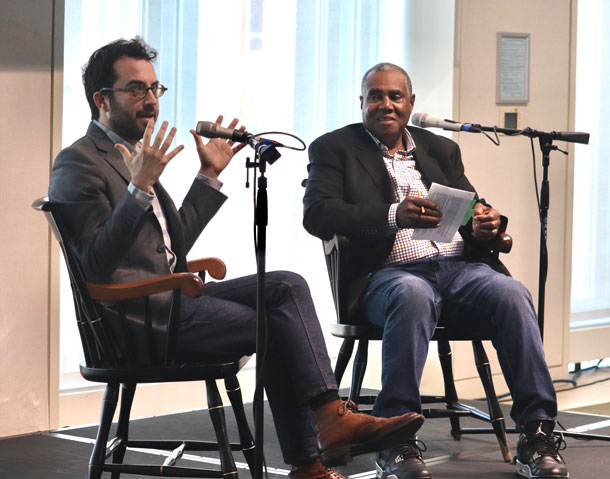
We Are the Weather explores how collective individual action can help fight climate change. (Photo: Lizz Malloy)
FOER: So there are four activities that are considered highest impact in terms of an individual's relationship to climate change, which are flying less, living car free, having fewer children, and eating a plant based diet. So 85% of Americans drive to work. And most Americans live in cities. Most Americans who live in cities, live in cities that were designed to require automobiles. More than half of the flights that are taken in the United States are either for work or for what are called non-leisure personal purposes. And most people aren't in the process of deciding whether or not to have a kid, right this second. So those are three things that we absolutely need to pay attention to and be vigilant about. But they are in a slightly different category than eating, which is a choice that we make three times a day, most of us. It's an unconstrained choice. And it's an opportunity to make a difference right away individually and ideally, collectively.
CURWOOD: Somebody might say, "Well, wait a second, Mr. Foer." The richest 10% of the population is responsible for half of emissions. There are a handful of corporations, that fossil fuel business that are pumping, there's carbon dioxide into the atmosphere. Really, eating to take this on as a form of collective action? And you would say?
FOER: I would say eating as another piece of that puzzle, not in lieu of those other things. It's absolutely the case that we cannot solve this by individual action alone. We need systemic change and legislative change, and food, it would be wonderful if the meat industry were regulated, even if the laws that were already on the books were adhered to. Would I prefer a world in which hamburgers cost what they actually cost, where, you know, the real costs weren't externalized, either because of subsidies or because of a lack of any environmental regulation? That would be great. That would make this much, much easier. I would prefer that. But it's not happening. A lot of the systemic changes that we require are not happening. And the marches and speeches are maybe bringing the change closer, but not quickly. And not quickly enough. So are there things that we can do that will have both real and tangible effects, but also might pull closer some of those systemic changes? You know, when we look at the Amazon burning right now, I haven't met anybody who isn't upset by those images and by that reality. Usually, the emotions that are inspired by those images take the form of anger at Bolsonaro, maybe to a lesser extent at Trump. But you know, 91% of Amazonian deforestation is for the purpose of animal agriculture, either to create land for animals to graze or to create land to grow crops for the animals to eat. I met many farmers in the process of writing the book Eating Animals a decade ago. And I heard over and over and over that we grow what people eat. You know, we are not making dietary choices for consumers; We grow what people ask us to grow. Corporations sell what people buy. It will not solve the problem, you know, any one of us choosing to eat a different dinner later today. But if we could collectively boycott beef, let's say. It's impossible to imagine, but let's just imagine it as a hypothetical. If we could have a global boycott of beef, then we would preserve Amazon.
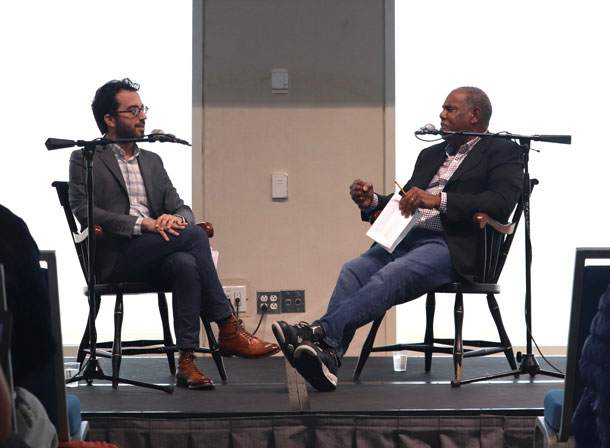
Jonathan Safran Foer suggested animal agriculture may be responsible for more than half of human-related greenhouse gas emissions (Photo: Lizz Malloy)
CURWOOD: So Jonathan, you struggle with having hamburgers from time to time yourself? You you preach this business of a vegetable based diet and yet the sizzle...
FOER: It's that voice again. You're making me hungry right now.
CURWOOD: ..burger slid on a toasted bun with your favorite sauce..
FOER: Yeah
CURWOOD: ...the aroma coming from the grill...
FOER: I'm gonna my saliva is going to destroy the microphone. You have to stop.
CURWOOD: Maybe a nice glass of red wine.
FOER: Well, red wine. nobody's taking away your red wine. You should enjoy your red wine. Have two have the red wines and maybe half of the burger. Yeah, I've had a hard time with it. I mean, I should say I haven't eaten meat in years. But that doesn't mean I don't want to, you know, pretty much every meal. I am not the kind of vegetarian who finds meat disgusting. When I see a burger, I don't immediately think meat is murder. I usually think boy, I'd like to eat that. I grew up eating meat. You know, I have a lot of very, very happy memories that involve meat eating: my grandmother's chicken, my dad's grilled hamburgers, the smoked salmon my mom would bring home on special weekends for, you know, treat with bagels. But it is important, I think to move away from the binaries of meat eater, and vegetarian or meat eater, and vegan, which has been our only way of thinking about meat reduction. You're familiar with the beyond burger?
CURWOOD: And the Impossible Burger.
FOER: And the Impossible Burger. 90% of consumers who buy Beyond Burgers in supermarkets also buy meat in that in the period of time that they conducted the study. When KFC introduced their vegetarian fried chicken in Atlanta, about a month ago, I think you may have seen images of people lined up around the block to eat it. What I found inspiring was the statement that KFC released on that day, which was we don't think of this as a food for vegetarians. We think of this as a food for meat eaters who want to reduce the amount of meat that they eat. So, you know, I don't think that there's any great chance that half of the population of America is going to be vegetarian in 10 years, I think there's a pretty good chance that half of the meals eaten in America will be vegetarian in 10 years. And that will have the same outcome in terms of the environment and in terms of animal welfare. But it's a completely different way of looking at the same problem. And it's my hope that we can make that shift away from these binary identities that require identifiers and toward a very reasonable reduction, eating in moderation, which I think people are not only willing but eager to do.
CURWOOD: Jonathan Safran Foer's book is called, We are the Weather: Saving the Planet Begins at Breakfast. Thank you so much for taking the time with me today.
FOER: Thank you. I really appreciated that conversation. Thank you.
Related links:
- We are the Weather: Saving the Planet Begins at Breakfast
- Jonathan Safran Foer
- Eating Animals by Jonathan Safran Foer
- World Watch Study on Animal Agriculture
[MUSIC: The RH Factor, “Listen Here” on Strength, Verve]
CURWOOD: Living on Earth is produced by the World Media Foundation. Our crew includes Naomi Arenberg, Bobby Bascomb, Paloma Beltran, Thurston Briscoe, Jenni Doering, Jay Feinstein, Merlin, Don Lyman, Lizz Malloy, Aynsley O’Neill, Jake Rego, and Jolanda Omari. Tom Tiger engineered our show. Alison Lirish Dean composed our themes. You can hear us anytime at L-O-E dot org, iTunes and Google play- and like us, please, on our Facebook page - PRI’s Living on Earth.
we tweet from @livingonearth. And find us on Instagram at livingonearthradio. I’m Steve Curwood. Thanks for listening!
ANNOUNCER: Funding for Living on Earth comes from you, our listeners, and from the University of Massachusetts, Boston, in association with its School for the Environment, developing the next generation of environmental leaders. And from the Grantham Foundation for the protection of the environment, supporting strategic communications and collaboration in solving the world’s most pressing environmental problems. Support also comes from the Energy Foundation, serving the public interest by helping to build a strong, clean, energy economy.
ANNOUNCER 2: PRI, Public Radio International.
Living on Earth wants to hear from you!
Living on Earth
62 Calef Highway, Suite 212
Lee, NH 03861
Telephone: 617-287-4121
E-mail: comments@loe.org
Newsletter [Click here]
Donate to Living on Earth!
Living on Earth is an independent media program and relies entirely on contributions from listeners and institutions supporting public service. Please donate now to preserve an independent environmental voice.
NewsletterLiving on Earth offers a weekly delivery of the show's rundown to your mailbox. Sign up for our newsletter today!
 Sailors For The Sea: Be the change you want to sea.
Sailors For The Sea: Be the change you want to sea.
 The Grantham Foundation for the Protection of the Environment: Committed to protecting and improving the health of the global environment.
The Grantham Foundation for the Protection of the Environment: Committed to protecting and improving the health of the global environment.
 Contribute to Living on Earth and receive, as our gift to you, an archival print of one of Mark Seth Lender's extraordinary wildlife photographs. Follow the link to see Mark's current collection of photographs.
Contribute to Living on Earth and receive, as our gift to you, an archival print of one of Mark Seth Lender's extraordinary wildlife photographs. Follow the link to see Mark's current collection of photographs.
 Buy a signed copy of Mark Seth Lender's book Smeagull the Seagull & support Living on Earth
Buy a signed copy of Mark Seth Lender's book Smeagull the Seagull & support Living on Earth

